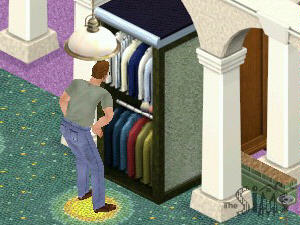Friday 20 December 2002

|
Pic of the day: Consumer of last resort. Screenshot from The Sims (Hot Date). Happy old year?The Economist refers to the year 2002 as "surprisingly good", and I tend to agree now that there are only a few days left. This is not to say there haven't been bad things happening to good people. The occasional terror attack, smoldering civil wars and the Palestinian intifada, AIDS spreading further (especially in developing countries) and two massive hunger catastrophes coming up in eastern Africa as the year draws to an end. But all of this is as expected. The epicenters of the famine areas are two rapidly worsening dictatorships, in Zimbabwe and Eritrea respectively. Dictators rarely worry overmuch over famine until it is there ... they are only human, and being responsible for more than a family is simply very hard for a human. Thus families of dictators rarely suffer from hunger, but their peoples do. So, the bad things were as expected, more or less on target. What was not expected was that the USA managed to stay its bloodlust on Iraq, and that the American economy grew nicely (along with most of the newly industrialized countries, mostly in Asia). Europe hasn't seen any economic growth to write home about, but it has calmed down a bit. I guess that counts for something too. The extension of the European Union eastward is not likely to solve all problems, but is giving new hope to millions of people tired of the flotsam and jetsam of a "communist" past. The year after the dot.com mass extinction, Internet shopping is far more common, and advertisement on the Net is steadily pilfering market share from other media. More and more people are connected, and broadband is slowly spreading. ***But if we look closer at the economy, the cheer starts to fade. The US Federal Reserve has slashed interest rates vigorously for the last couple years. Not only does this ease the burden on people with debt, which is most of the middle and lower classes. It also raises property prices, making home owners feel richer. But this is a process that needs fuel. Once the interest rates reach bottom, people don't get this extra money anymore. Once it is spent, it is spent. And at the same time, tax cuts and defense spending has turned a large budget surplus into a large deficit. This cannot go on, either. It has to stop, one way or another. If we imagine the economy without these large heaps of pork being thrown at it, we will find stagnation. Compare with the EU and Japan, none of which have had the luxury of giant tax break or public spending, and without the drastic fall in interest rates. Both of them are sliding sideways into the future, as I expected. The USA can get used to this too, or they can continue to cover up and hope that the future will be good enough to pay it all back. History shows that defense spending is not the best way to keep people employed. It gives them money, but it doesn't produce goods and services for the populace to buy with that money. Standard of living declines. We have detailed scrolls on this topic for several thousand years, and they show that heavy spending in the military sinks a country into debt. The USA has good reasons to spend money on defense, compared to many others. But the laws of nature still apply. There will be a price to be paid, and as usual it is the common people who must pay it. You can't cover it forever. |
Still mild. |
Yesterday <-- This month --> Tomorrow?